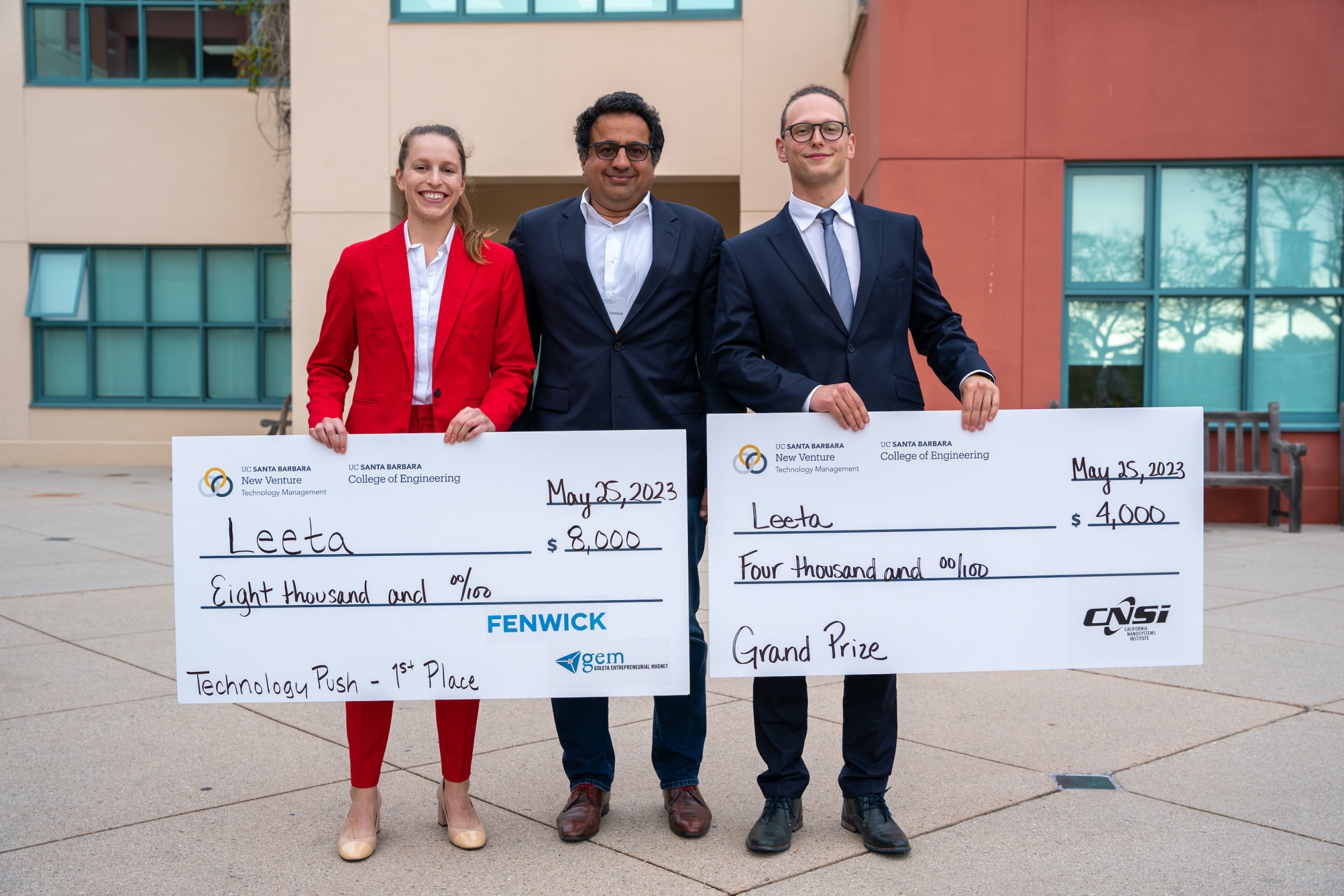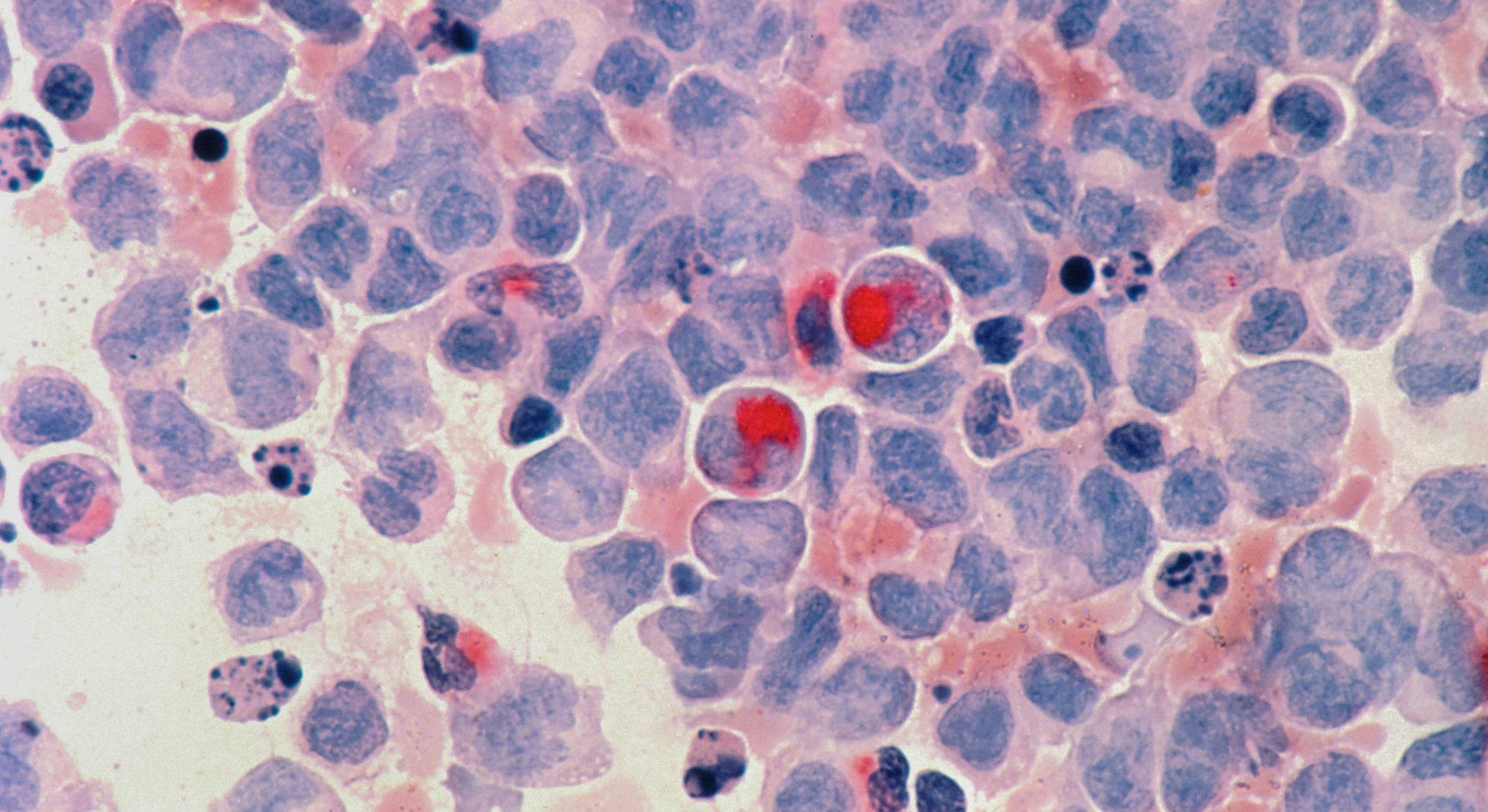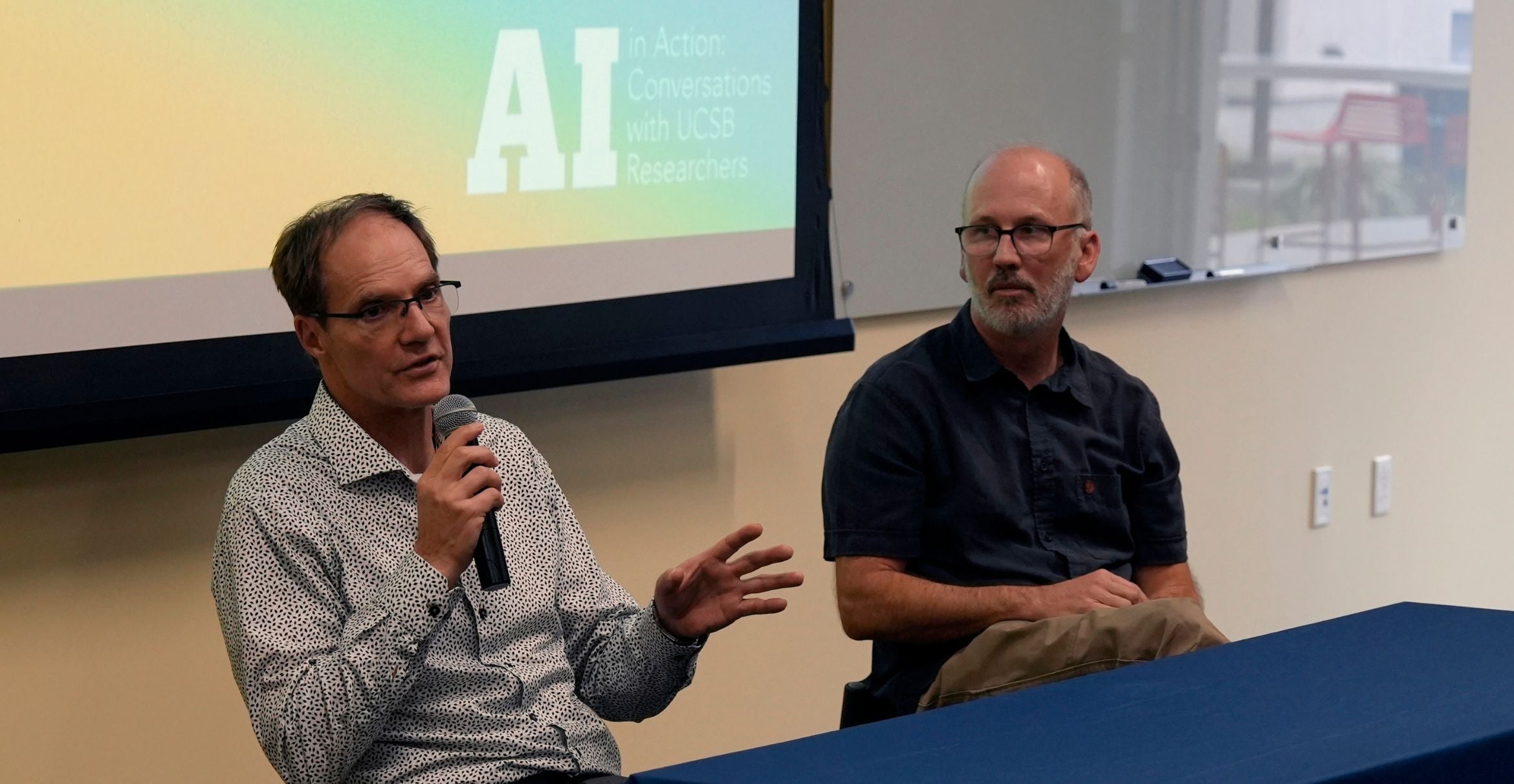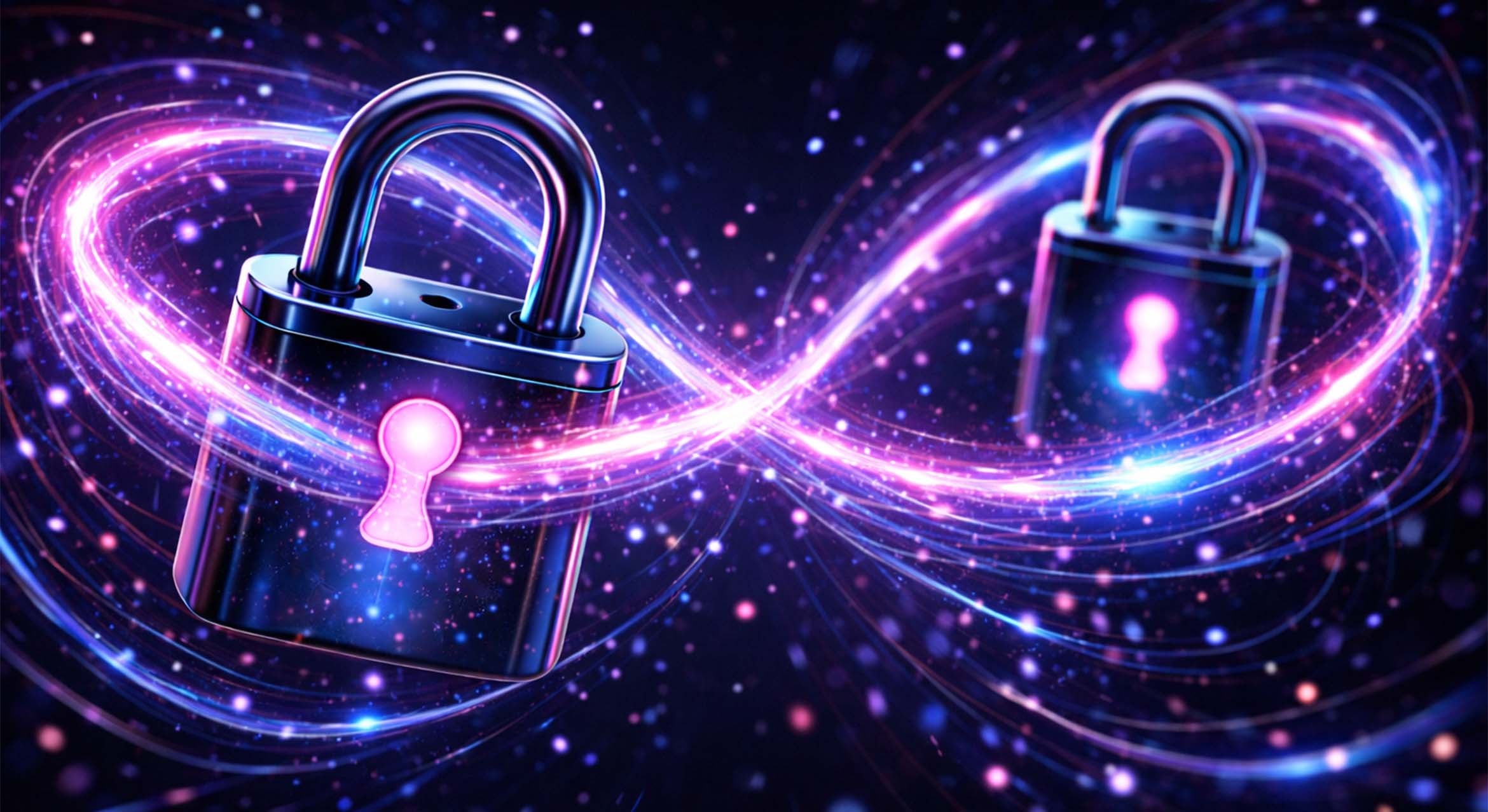
Pitching a faster and more sustainable manufacturing process to close the supply-and-demand gap for lithium-ion battery materials, Leeta, a team comprising two materials Ph.D. students, won the grand prize at UC Santa Barbara’s 24th Annual New Venture Competition (NVC) Finals, earning a total of $12,000 in cash and a start-up grant. The final marked the culmination of the Technology Management (TM) Department’s rigorous eight-month technology business plan competition that was open to students from all disciplines at UCSB.
“We are extremely grateful that our work was recognized and validated by winning the grand prize,” said Kira Wyckoff, a fifth-year Ph.D. student advised by Ram Seshadri, a distinguished professor in the Materials Department and the Department of Chemistry and Biochemistry.
Because the domestic supply chain cannot meet demand for battery materials, Wyckoff said, manufacturers are forced to procure less reliable materials overseas, which result in lower performance batteries. Wyckoff and Linus Kautzsch, a fourth-year Ph.D. student co-advised by Seshadri and materials professor Stephen Wilson, developed a novel heating technology to manufacture high-quality battery materials domestically — a scalable microwave-assisted manufacturing process.
“Microwave-assisted synthesis is a fundamentally different heating mechanism than traditional furnace heating, which is the industry standard,” explained Kautzsch. “In our process raw materials are heated directly, as opposed to furnace heating, where an entire furnace is heated, and then that heat is transferred to the raw materials inside. Furnace heating is less efficient than microwave heating.”
In their graduate work, Kautzsch and Wyckoff studied a wide variety of advanced materials synthesis techniques, work that confirmed microwave-assisted synthesis results in ultra-fast materials conversion times.
“We estimate a 30% energy savings, based on calculations that model our large-scale continuous process, and we are excited to begin device fabrication and testing to confirm these numbers,” said Wyckoff, adding that the process also reduces conversion times of raw materials from minutes to seconds.
Leeta will focus on manufacturing cathode material, the most important component inside a lithium-ion battery, which also accounts for half the cost of a cell. The team’s business model is to procure raw materials from mining companies and refineries and convert the raw materials into high-quality cathode materials through its microwave heating process, which will then be sold to battery manufacturers.
“We have big plans for Leeta moving forward,” said Kautzsch.
The team’s first course of action will be to secure additional funding. They are in the process of applying for a handful of government grants that support the development of advanced manufacturing for energy materials, in addition to speaking with local angel investors. They also plan to launch Leeta in the university’s California NanoSystems Institute (CNSI) Technology Incubator later this year.
“Overall, this win affirms our venture and gives us the confidence and momentum to carry it forward,” said Wyckoff, who is also a graduate research fellow of UCSB’s Institute for Energy Efficiency.
Leeta was one of six teams competing for more than $40,000 in prizes during the NVC Finals in Corwin Pavilion. In addition to vying for the overall Grand Prize, Runner-up and People’s Choice Awards, teams were sorted and judged in two categories: technology push, where they created novel technology to solve a challenging problem; and market pull, where businesses used existing technologies to meet an unmet market demand. Each team pitched their products and business plans and answered questions from a judging panel made up of tech entrepreneurship experts and investors.
Judges awarded Leeta the overall grand prize of $4,000 and first place in the technology push category for an additional $4,000 in cash and a $4,000 start-up grant.
Pitching a real-time precision drug release and monitoring platform, Hikari received second place in the technology push category and was named runner-up in the overall competition for a total prize of $9,000. Apical Robotics received $4,500 for its third-place finish in technology push and the People’s Choice Award. The six-person team pitched its soft-robot technology to inspect chemical facilities and replace human inspectors in complex and hazardous maintenance operations.
Aiming to make biology easy to learn and accessible to everyone, everywhere, Bright Labs won first place in the market pull category to receive $8,000 in cash and a start-up grant. Second place in the category and a total of $6,000 in cash and a start-up grant went to Ocean Pulse, a team that developed a system to deliver real-time marine data through a series of self-sustaining oceanographic buoys. Wafer Path, a cloud-based platform for managing the research and development of novel devices for the photonics industry, received third place and $2,000.
Dave Adornetto, the TM Department’s entrepreneurship director, said that the final represented the end of a record-setting year for the university’s flagship entrepreneurial experience. More than 350 students, sorted into 50 teams, filled the roster at the start of the academic year, nearly double the normal turnout. Mentored by dozens of individuals who have lived and thrived in the fast-paced world of tech entrepreneurship, students honed their entrepreneurial skills, refined their business plans and practiced pitching their stories and ideas. Of the dozens of teams that started the program in October 2022, 20 teams were selected to participate in the NVC Fair in May; six of those advanced to the finals.
“This was one of the strongest groups of finalists the competition has ever seen, the result of having 50 teams in the pipeline,” said Adornetto. “In the end, what separated Leeta was the strength of the founders, their commitment to the process of building a market-tested business model, and their ability to identify a significant business opportunity for their novel technology.”
This year’s judges included Deborah Naish, the founder and principal of Naish Partners and a former manager at Walt Disney and Clorox; Jay McGonigle, the former chairman and CEO of the Corporate Executive Board Company; Matthew Stotts, the founder and general partner of Cerulean Ventures and an adjunct faculty member of UCSB’s Technology Management Department; and Pamela Johnston, the founder and principal of Johnston Consultants, which specializes in global expansion strategies for digital consumer service brands including Pandora.
To watch a replay of the NVC Finals, click here, or to learn more about the NVC, visit this page.
Andrew Masuda
College of Engineering
Office: (805) 893-4803
Email: amasuda@ucsb.edu



